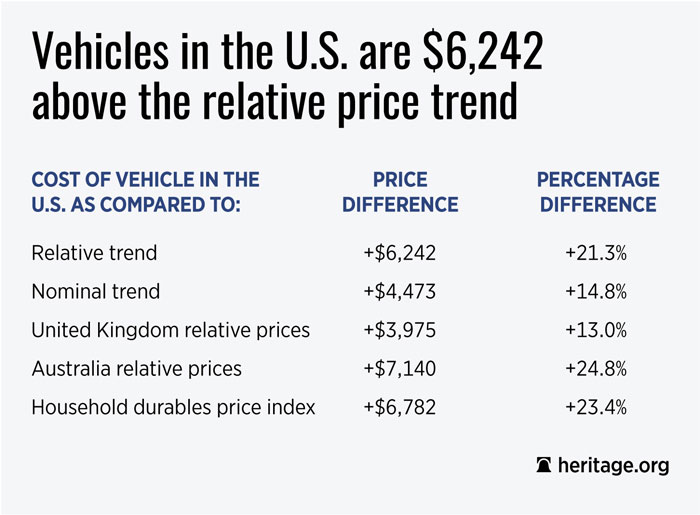When Congress and the Obama administration passed and implemented extremely strict fuel economy regulations, the Environmental Protection Agency (EPA) claimed that it would save consumers a few thousand dollars on gas and add only $948 to the price of a new car.
The most modest of the independent estimates works out to $3,800 per vehicle, even after the fuel savings are taken into account.
Three teams of independent economists and engineers went up against the EPA’s analysts—finding much larger costs and smaller benefits. The most modest of the independent estimates works out to $3,800 per vehicle, even after the fuel savings are taken into account.
So whose predictions were more accurate?
Although we don’t know how prices would have changed if regulations had been left alone, there are several trends that all moved together before the law was changed in 2007.
- The price index for vehicles (adjusted for quality improvements), published by the Bureau of Economic Analysis, had been falling steadily since the 1990s.
- The prices of other large consumer goods—“furnishings and durable household equipment”—had been falling even longer, as modern manufacturing and trade made things like dishwashers and sofas cheaper.
- Prices for vehicles had been falling at about the same rate in the U.K., Australia, and Canada.
So what happened? Several of these trends showed turbulence during the 2008-2009 global crisis but then resumed their downward paths. The exceptions were car prices in the U.S. and Canada, which enacted similar new, more stringent fuel economy standards.
In a recently released Heritage Foundation research paper, we’ve compared the recent price trends to the scholarly predictions and found that if U.S. vehicle prices had followed one of the comparable trends, cars would be between $3,975 and $7,140 cheaper today than they are. This massive expense buys very little change in global warming: less than two hundredths of a degree, according to the Obama administration’s own estimate.
Congress should scrap Corporate Average Fuel Economy (CAFE) standards entirely—they cost consumers dearly while having a negligible impact on carbon emissions. Failing that, a new administration can freeze the standards at 2016 levels to prevent the Corporate Average Fuel Economy tax from doubling by 2025, as the Obama administration has planned.





























